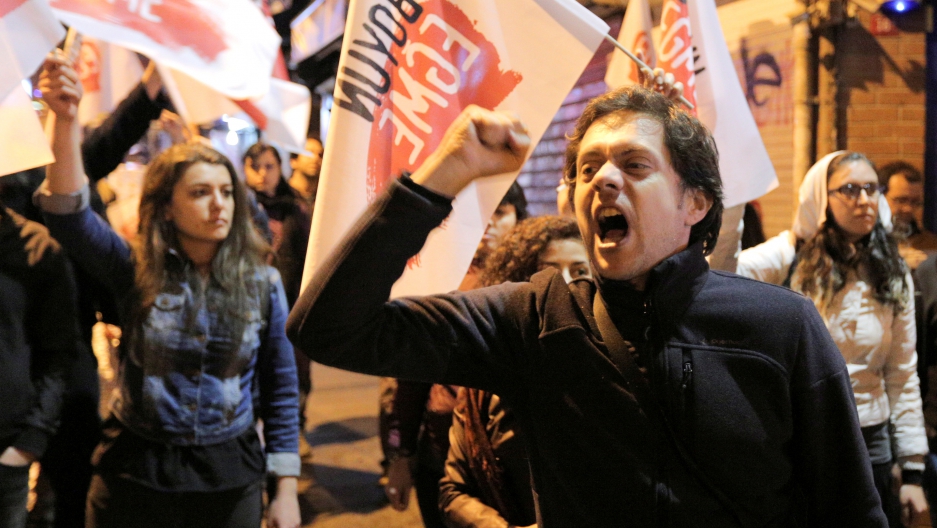-
Tips for becoming a good boxer - November 6, 2020
-
7 expert tips for making your hens night a memorable one - November 6, 2020
-
5 reasons to host your Christmas party on a cruise boat - November 6, 2020
-
What to do when you’re charged with a crime - November 6, 2020
-
Should you get one or multiple dogs? Here’s all you need to know - November 3, 2020
-
A Guide: How to Build Your Very Own Magic Mirror - February 14, 2019
-
Our Top Inspirational Baseball Stars - November 24, 2018
-
Five Tech Tools That Will Help You Turn Your Blog into a Business - November 24, 2018
-
How to Indulge on Vacation without Expanding Your Waist - November 9, 2018
-
5 Strategies for Businesses to Appeal to Today’s Increasingly Mobile-Crazed Customers - November 9, 2018
Opposition to challenge votes on expanding Erdogan’s powers
Global observers cited flaws in Sunday’s controversial referendum in Turkey while European leaders urged reconciliation in a divided country and warned Ankara of its commitments on the death penalty.
Advertisement
Hundreds of people demonstrated in two separate neighbourhoods of Istanbul overnight, protesting against a narrow win for President Recep Tayip Erdogan in a referendum granting him greater powers.
The referendum campaign was conducted on an “unlevel playing field” and the vote count itself was marred by the late procedural changes that removed key safeguards, global observers said.
The combined effect seriously tarnished President Recep Tayyip Erdogan’s close victory in the vote on Sunday, which replaces a century-old parliamentary democracy with a “presidential system” that greatly expands the president’s authority and would allow Erdogan to serve for another 15 years in office. Nevertheless, it could cement his hold on power in Turkey for a decade and is expected to have a huge effect on the country’s long-term political future and its worldwide relations.
“Cabinet ministers would no longer have to be members of Parliament, and the Parliament would not have power over Cabinet appointments – ministers would be appointed directly by the president”.
“The president survived a coup attempt a year ago and responded with a crackdown, jailing 47,000 people and sacking or suspending more than 120,000 from government jobs such as schoolteachers, soldiers, police, judges or other professionals.The changes could keep him in power until 2029 or beyond, making him easily the most important figure in Turkish history since state founder Mustafa Kemal Ataturk built a modern nation from the ashes of the Ottoman empire after World War One”. With the new constitution, Erdogan can technically stay at his post until 2029.
The Supreme Court will also change – there are now 22 Supreme Court judges, four of whom are appointed by the president.
The French foreign ministry called on Turkey to respect the European Convention on Human Rights, which prohibits capital punishment, and said it would be assessing the OSCE’s conclusions. The referendum has exacerbated the already strained relations within the Turkish society between various political groups, between Erdogan supporters and the others.
“Generally speaking the referendum fell short of CoE standards.it did not provide for a truly democratic process”, Cezar Florin Preda said.
Earlier Monday, the OSCE claimed a “lack of equal opportunities, one-sided media coverage and limitations on fundamental freedoms” had created an “unlevel playing field” in Turkey’s referendum. The opposition has cried foul and is demanding a recount of at least 37% of the votes.
At the headquarters of his party the Turkish Prime Minister said that the vote should not divide the Turkish people and that the country would continue its effort to improve the economy and fight its internal and external enemies. The pro-Kurdish Peoples’ Democratic Party (HDP) has also contested the results.
“I suspect the result was narrower than what Erdogan expected”, said Howard Eissenstat, associate professor of Middle East History at St. Lawrence University in Canton, New York.
“There is an worldwide commission that is reviewing this and issues a report in 10 to 12 days”.
Advertisement
The results have done little to relieve the tensions in divided Turkey. While supporters claim that the change will bring on a more stable and efficient government, opponents have said that the move is a unsafe step toward one-man rule.





























